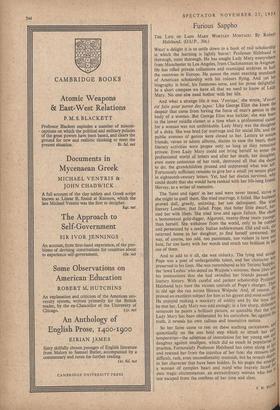Furious Sappho
WHAT a delight it is to settle down to a book of real scholarship in which the learning is lightly borne! Professor Halsband is thorough, most thorough. He has sought Lady Mary everywhere from Manchester to Los Angeles, from Clackmannan to Avignon. He has rifled private collections and municipal archives in half the countries in Europe. He passes the most exacting standards of American scholarship with his colours flying. And yet his biography is brief, his footnotes terse, and his prose delightful. In a short compass we have all that we need to know of Lady Mary. No one else need bother with her life.
And what a strange life it was. enrage,' she wrote, 'el' ai oir ere faire pour porter des jupes.' Like George Eliot she knew the despair that came from having the force of man's genius in the body of a woman. But George Eliot was luckier; she was born in the lower middle classes at a time when a professional career for a woman was not unthinkable. Lady Mary was the daughter of a duke. She was bred for marriage and for social life, and the public avenues of genius were closed to her. Letters to amuse friends, verses to adorn albums, diaries to ease the heart, these literary activities were proper only so long as they remained private. Even Lady Mary could not bring herself to enter the professional world of letters and after her death, her daughter' even more conscious of her rank, destroyed all that she dared to do; the grandchildren pruned and suppressed what was left' Fortunately sufficient remains to give her a small yet secure place in eighteenth-century letters. Yet, had her diaries survived, who could doubt that she would have ranked with her life-long friend, Hervey, as a writer of memoirs.
The 'lions and tigers' in her soul were never tamed, strive she might to quell them. She tried marriage, it failed. Her husb proved dull, greedy, unloving; her son delinquent. She literary London; that failed. Pope, that bitter little dwarf, tied her with libels. She tried love .and again failure. She ch a homosexual gold-digger, Algarotti, twenty-three years youn than herself. She withdrew from the world, only to be rob and persecuted by a seedy Italian noblewoman. Old and sick, returned home to her daughter, to find herself unwanted. was, of course, too odd, too passionate, too violent in love hate, far too hasty with her words and much too brilliant in use of them.
And to add to it all, she was unlucky. The lying and sav Pope was a poet of unforgettable talent, and her character in his lines. She was remembered as his 'furious SapP1 the 'lewd Lesbia' who doted on Walpole's mistress; these jibes his insinuations that she had swindled her friends passed II literary history. With careful and patient scholarship Profes Halsband lays bare the vicious untruth of Pope's charges. 11 in old age shAt ran across Horace Walpole. And, of course, proved an excellent subject for him at his gayest and most satin He enjoyed making a mockery of oddity and by the time tl he met her, Lady Mary was odd enough; in a few sharp, dishon sentences he paints a brilliant picture, so quotable, that the Lady Mary has been obliterated by his caricature. Set against it reveals his own callous and insensitive nature.
So her fame came to rest on these scathing caricatures, quixotically on the one bold step which so struck her ct temporaries—the adoption of inoculation for her young son e daughter against smallpox, which did so much to popularise practice. Fortunately Professor Halsband has come along at I and rescued her from the injustice of her fate; she remains 0( difficult, rash, even uncomfortably mannish, but he reveals dePI in her character that have been hidden. In his pages she emerl a woman of complex heart and mind who bravely faced I own tragic circumstances, an extraordinary woman who has last escaped from the confines of her time and class.
as tied hat'
ose ger
bed
she She and et ryas ho, the age as ad to or ce he al, at est tae he and
n.
od its
51 d, 115 es et at
J. H.










































































 Previous page
Previous page